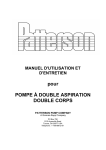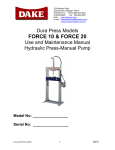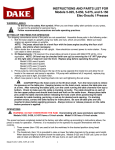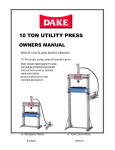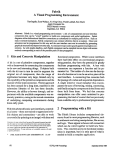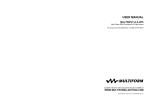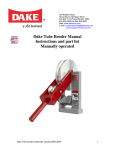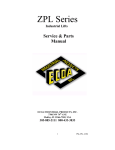Download Sinclair Duro Specifications
Transcript
724 Robbins Road Grand Haven, Michigan 49417 616-842-7110 Phone 800-937-3253 616-842-0859 Fax 800-846-3253 Web: www.dakecorp.com E-mail: [email protected] [email protected] Dura Press Models FORCE 40, 70 & 100 Dual voltage machines for 220 / 440 volts Use and Maintenance Manual Model No: _________________ Serial No: _________________ Force 40 70 100 Ton 1 Model Max Ton Width between uprights Width between table channels Max. Ram travel Max. Ram to table Ram rapid advance Ram pressing speed Base (W x D) Height Weight FORCE 40 40 35" 8" 19" 37" 68 ipm 7 ipm 63" x 27" 88" 880 lbs. FORCE 70 70 35" 8" 19" 37" 42 ipm 4 ipm 63" x 27" 88" 1100 lbs. FORCE 100 100 41" 10" 19" 39" 52 ipm 3 ipm 75" x 33" 90" 2200 lbs. Maximum operating pressure for all models 280 bars Sound pressure maximum 78,6 db For the safety of the operator/owner it is your responsibility to review the follow warnings and safety labels located in this manual and on the machine. It is the responsibility of the operator/owner to understand these labels. If there are any questions regarding these labels call Dake at 1-800-937-3253. Below is a diagram of where the safety labels are required. Part number 76462 Part number 300168 Part number 84935 Part number 84487 Part number 84399 If at any time these safety stickers need to be replaced or are missing lock out the machine and contact Dake immediately. Force 40 70 100 Ton 2 The operator and owner must read and understand all of the following warnings. It is the responsibility of the employer to check that the following warnings have been understood by the operator and maintenance personnel. WARNING!!!! Operator must never place hands in the area of the ram during pressing operations. Do not use this press for pulling. A machine not subject to maintenance and periodic structural inspection is a danger for the operator and the persons working near by. It is strictly forbidden to tamper with, modify or elaborate parts of the machine that alter its regular operation. During the phases of maintenance requiring guards to be removed, machine must be locked out according to local and state laws. This press is designed for one operator. All work requiring the piece to be pressed to be supported by the operator is forbidden. It is strictly forbidden to press, cut, draw and do anything else with pieces whose dimensions or physical nature may explode or produce splinters. DEFINITIONS In this manual “right side”, “left side”, forwards, backwards, top and bottom refer to the operator situated in front of the press with the power unit to there right. Press Identification The press is fitted with a rating plate fixed in a visible manner on the front as shown in Fig. 1 item 1 on next page. The Dake part number and serial number on the front name plate shown in Fig. 1 item 2. Force 40 70 100 Ton 3 Item 1 Item 2 Unpacking Fig. 1 The machine has shrink wrap on it and any accessories, spare part may be Packed in cardboard boxes and positioned on top of the work table. To remove the packing, cut the plastic wrap, taking care not to damage the Machine or any part of it. Remove the accessories from the top of the work table, check the contents correspond to the order and to the accompanying documentation. Remove the lag bolts that hold the press to the skid. Disposing of the packaging Fig. 3 The packing will have to be disposed of be the purchaser in compliance with the current regulations. Claims shall not be accepted in the event of the goods not being in conformity with order or with the accompanying documents if they are not notified within five days of the date of receiving the goods. Handling and transport and positioning For handling the machine it is necessary to use special lifting equipment whose maximum lifting capacity must be no lower than the total weight of the press which can be found on page 2 of this manual. Loading and unloading the machine Use lifting straps are to be used to position as shown below in Fig 4. WARNING!!! Be sure the maximum capacity of each strap is greater than the total weight of the press. Force 40 70 100 Ton 4 Do not make sudden movements when transporting the machine. The manufacturer is not responsible for damage to the machine while loading or unloading the press. Pick up here Pick up here Fig. 4 Positioning the press Simple precautions are necessary for correctly positioning the press always consider the safety aspect not only in relation to the work carried out with the press, but also to the dangers originated by the other machines in the workplace. Do not position on unstable or unleveled floor. Below in fig. 4 is the allowable distance from the wall, other machines or other objects. Fig. 4 Commissioning and Starting Electrical connection This machine is dual voltage 220 3 phase / 440 3 phase. The amp rating on these machines are 6.8 amps on 220 volt 3 phase and 3.4 amp on 220 volt 3 phase. WARNING!!! Only a certified electrician that follows local and state laws is authorized to perform any type of electrical connection on this machine. The electrical power supply voltage must be made in compliance with local and state laws. Force 40 70 100 Ton 5 For proper operation it is necessary to ensure constant voltage and it must not exceed or be lower than 5% of the rated value. Before making any electrical connection confirm voltage rating of the machine. There is a black plastic box mounted on top of the reservoir. WARNING!!! Be sure there is no power to the machine before checking the following connections. It may be necessary to lock out the machine for proper power disconnection. Remove the two mounting screws that hold this box in place. Under this box you will see one of the following possibilities in fig. 5. After confirming or changing this to the correct voltage mount the cover with the two screws. Now, open the electrical panel on the transformer be sure it is set for the correct output voltage. Fig. 5 220 Volt connection 440 volt connections WARNING!!! Any damage caused by a faulty electrical connection is not covered by warranty. Filling the pumping unit To fill the pumping unit, use exclusively the oils indicated in the table on the next page or equivalent. The environmental conditions must be considered before purchasing oil. To transfer the oil from the container to the tank use an external filter as shown in Fig. 6 in order to prevent the introduction of foreign material or liquids at the time of filling. The amount of oil required for each model is described in the chart below. 40 Ton 70 ton 100 Ton 10.5 Gallons 10.5 Gallons 15.5 Gallons A - Oil Force 40 70 100 Ton B - Pump 6 C - Filter D - Press Oil Fig. 6 Pump rotation After making the electrical connections to the press it is necessary to make a visual check on the direction of rotation of the electric motor. Before checking the direction of rotation of the pump, fill the reservoir with oil see Fig. 6 1. 2. 3. 4. Unscrew the inspection cap. Identify a reference point on the drive shaft. Power up the motor for Max. 1-2 seconds. Check that the rotation of the shaft coincides with that of the arrow shown on the top of the unit see Fig 7. 5. Screw down inspection cap. If the motor rotates in the wrong direction: See your electrician. Fig. 7 Any damage caused by wrong electrical connection is not covered by warranty Force 40 70 100 Ton 7 Gravity Maximum Pour Flash Point Viscosity @ 100 F. Viscosity @ 130 F. Viscosity @ 210 F. Color Viscosity Index Also Passes ASTM Rust Test Oiliness Additive DTE Oil No. 24 31 20 F. 395 F 145-160 84.5 44 3 Max. 95 Min. DTE Oil No.26 26 20 F 400 F. 290-310 144 53 3.5 Max. 95 Min. Yes Yes Yes Yes Pacemaker Oil NO. XD 15 Nuto H32 Harmony No. 43 AW Puropale Rx Anti Wear No. 150 Pacemaker Oil No. XD30 Nuto H68 Harmony No. 54AW Puropale Rx Anti Wear No. 300 Tellus Oil No. 32 Duro Oil AW16 Rycon Indl Oil No. 15 Sunvis No. 706 No. 816 WR No. 475 Diamond Roza L Tellus Oil No. 68 Rycon Indl Oil No. 31 Sunvis No. 754 No. 831 WR Rando Oil No. HD-32 Rando Oil No. HD-68 Competitive Oils Equivalent to above specifications Cities Service Exxon Co. Gulf Oil Co. Pure Oil Co. Shell Oil Sinclair Oil Standard Oil Sun Oil Co. Sunray DX Oil Co. Texaco Duro Oil AW31 No. 477 Diamond Roza H To obtain best results oil temperature should not exceed 140 F. When using DTE No. 26 as an Alternative for DTE No. 24 there might be a slight variation in the ram speeds. First starting After filling the reservoir through the fill cap it is necessary to prime the pump. Check that all the valves and distributors are in the rest position, at the time of starting do not operate any movement. To obtain starting it may be necessary to press the reset button in the electrical panel. Force 40 70 100 Ton 8 WARNING!!! This press is exclusively prepared to be used only by one operator. To prime, jog the start button (electric motor). When the unit emits a dull sound with no jumps and the sound of the pump is constant. An uneven “tinny” noise indicates there is air in the pump. The oil in the reservoir may fall on start up due to: 1. absorption of volume by the cylinder 2. Absorption of volume by the pumping unit. 3. Discharge of air bubbles remaining in the piping. It is necessary to top off the level of oil bringing it up to the correct height, by checking the level gauge. The level should be about half way up the stick. Operation Before starting any operations make sure there are no other persons in the immediate vicinity of the machine. It is strictly forbidden to pass under the work table. To operate the cylinder, activate the master switch, and then operate the distributor lever Fig. 8. Pulling - the lever toward the operator (Pos. 2) the piston rod lowers. Pushing - the lever from the opposite side to the operator (Pos. 3) the piston rod will go up. Releasing - the lever will return to the neutral position stopping the ram from moving (Pos. 1). With the hand wheel positioned on the side of the distributors (Fig. 8 Pos. 4) it is possible to adjust the operating pressure continually and therefore the pressing force of the cylinder. The pressure gauge (Fig. 7 Pos. 5) allows displaying the pressure during the working phases. Adjustment of the maximum pressure must be made starting from the lower value and gradually increasing to reach the pressure necessary to perform the operation to be carried out. Dake declines all liability for damage to things and/or persons caused by tampering with the pressure control valve fitted on the unit. Force 40 70 100 Ton 9 Fig. 8 Work table height adjustment To optimize the use of the press it is necessary to set the work table at a convenient height in relation to the operation to be carried out and to the equipment to be used. Before proceeding to lift the mobile table, check that: - The eyebolts fixed to the work table are fully tightened Pos. 01. - The eyebolt support (nose piece) is properly screwed onto the cylinder ram (Pos. 2) - The eyebolts fixed to the nose piece are fully tightened. 1. Hook the chains (Pos. 5) to the respective eyebolts and lift the cylinder ram until the chains are set under tension but, do not lift the table. 2. Check the chain connections to all eyebolts to ensure a safe secure connection. 3. When the connection is safe, lift the table just above the desired table height. 4. Take the split pins (Pos. 6) off the pins then remove the pins. 5. Insert the pins to the desired work table height pin location then, insert the split pins. 6. Slowly move the table down until it rests on the table pins. 7. Check to be sure the position and the assembly of the pins are correct. 8. Unhook the chains and leave them hang in a downward position (Pos. 5). Pos. 6 Pos. 2 Pos. 3 Pos. 1 Pos. 5 Force 40 70 100 Ton 10 Operating Temperature After the machine has been put into operation at full rate, check that the oil temperature does not exceed 140 F. If the above described conditions are exceeded, check that the fluid used is not too viscous (replace with more suitable fluid). Using the unit with temperatures above those indicated above automatically forfeits warranty. Maintenance Routine Maintenance operations must be carried out by authorized and trained personnel. All maintenance or cleaning operations must be done with the machine properly locked out in accordance with OSHA regulations. Below is a table with the normal times for maintenance work: HOURS 50 100 300 500 1000 1500 2000 CHECK OIL FILTER YES CHECK OIL CHANGE OIL CHANGE OIL FILTER CHANGE AIR FILTER YES YES YES YES YES YES YES YES YES YES YES YES YES Changing the oil The oil will have to be changed periodically every 2000 operating hours or at least once a year. Empty the unit tank by arranging a container of an adequate capacity to contain the quantity of oil to be removed under the drainage plug at the bottom of the tank. Remember to tighten the plug before filling the tank. Disposing of the oil will have to be done in conformity with local and state laws along with OSHA regulations. Hydraulic oil is considered special waste. Filters The filter must be frequently replaced during the first period of operation of the press and then at regular intervals of time to be defined according to the conditions of use and the environment where the machine is located. It is recommended to change the filter after the first 100 hours of operation. After that approximately every 500-600 hours. Force 40 70 100 Ton 11 On this unit there are three filters: - Oil outlet filter - Oil inlet filter - Air inlet filter Replacing the filters will help give the pump, oil and generally all the moving components longer service life. Failure to comply with the maintenance table in changing the filter will forfeit the warranty. Force 40 70 100 Ton 12 Malfunction Origin Air in the pump. Air in the circuit Damaged cylinder gaskets Damaged or worn pump Sequence valve jammed Delivery oil line clogged or choked Remedy Bleed the air Bleed the air Replace the gaskets Replace the pump Recondition seq. valve Check hydraulic lines Electric motor will not turn Piston gaskets completely Damaged Blocked distributor Damaged pump Check motor Replace Recondition distributor Recondition or replace Head gaskets damaged or worn Lack of pressure from pump Pressure control valve set low Filter Suction clogged Fluid too viscous Fluid level too low Fluid unsuitable Fittings or joints let air in Air discharge in the circuit Replace Recondition pump Set valve Clean or replace Replace Bring back up to correct level Replace with suitable fluid Replace or tighten fittings Discharge the remaining air from the system Worn or damaged Operating instability Recondition or replace Replace or recondition Pumps worn or damaged Replace and recondition Pump joint broken or undone Valve seat damaged Pressure not constant Dirty fluid Check or replace Replace or recondition Check pump or pressure relief valve Drain off fluid clean system and components refill with clean and filtered fluid Piston moves irregularly or will not move Lack of pressure from the pump Pressure adjustment valve set low The translating cylinder is damaged Translating wheels or guides dirty or blocked Recondition the pump Set the valve Check and recondition Clean or replace parts Excessive wear on parts Oil containing abrasives Insufficient lubrication High operating pressure Foreign bodies in the oil not held back by the filter Replace the fluid Poor quality oil Lowe the setting of the pressure relief valve Insufficient filtering, replace the filters Cylinder moves slow Piston will not move Cylinder leaks oil Piston ram will not build pressure Pump Cavitation Foam forms in the fluid Pumps Pressure relief valves Pumps deliver little or no oil Pump will not turn Unstable valves Valve parts jammed Force 40 70 100 Ton 13 Putting out of service In the case of not operating for a long period it is necessary to disconnect the press from the sources of electrical power supply. Empty the unit of oil and protect it suitably so there is no dust, moisture or other foreign bodies that can damage the parts of the unit. Demolition and division of materials If you are not going to use the machine any more, it is recommended to make it inoperative by removing the oil contained in the tank and eliminating the oil remaining in the cylinder, hydraulic lines, pump body and valves. When going for demolition the press must be treated as special waste, it must therefore be split up into its homogeneous parts, these parts must be separately disposed of in conformity with local and state laws along with all OSHA regulations. Force 40 70 100 Ton 14 Electrical box Parts breakdown 1 2 3 4 Item # 1 2 3 4 5 6 7 7A 8 Part Name Pump Start button Stop button Start button Emergency button Power light Main power switch Elect. Box lock Door key Female plug N/A Male plug Electrical box w/ all components Electrical box w/ no components N/A N/A Force 40 70 100 Ton 5 6 15 7 Part number 716542 716539 716556 300351 300298 80554L 300628 80511 8 Qty. 1 1 1 1 1 1 1 1 301547 1 300387 1 300389 1 Electrical box components parts 1 2 Item # 1 2 3 3 3A 4 5 5B 6 6A Force 40 70 100 Ton 3 4 Part Name Contactor Transformer Overload 220 volt Overload 440 volt N.O. contact block Relay Fuse block Fuse 2 amp Terminal block ground Terminal block black 5 6 40 Ton 70 Ton 100 Ton 300842 302187 302189 302192 72300000 300843 77523 300842 302187 302189 302192 72300000 300843 77523 300842 302187 302188 302192 72300000 300843 77523 16 Qty 1 1 1 1 1 1 1 3 2 3 2.6 Exchange valve Item # 1 N/A N/A Force 40 70 100 Ton Part Name Complete relief valve O-ring kit spring washer Valve handle Part # 40 Ton 300178 Part # 70 Ton 300178 Part # 100 Ton 300178 Qty 1 1 301393 17 301393 301393 1 2.5 Distributor section Item # N/A 1, 2, 3, 4, 5 6, 9, 10 Not shown 7 8 11, 12, 13 Force 40 70 100 Ton Part Name Complete valve assembly Knob lever pin fork powder scraper Shaft group cap group main body Relief valve Cover Body Gasket Set Back valve body entry collector body max valve 18 Part number 300179 302211 302210 300852 302209 300886 302208 Qty 1 1 1 1 1 1 1 Cylinder breakdown 8 4 7 1 2 Item # 1 2 3 4 5 6 7 8 8A Not shown Not shown Not shown Force 40 70 100 Ton Part Name Piston Gasket Piston 0-ring Head guide rings Head o-ring Head gasket Head scraper Washer Hose fitting top Hose fitting bottom Complete cylinder Gauge Hydraulic hose B port Hydraulic hose A port 3 5 Part# Part# Part# 40 Ton 70 Ton 100 Ton 300609 301195 301189 300610 301196 301186 300647 301197 301187 300648 301198 301188 300649 301199 301185 300650 301200 301184 Washer comes with fitting 301390 301390 301390 301390 301390 301390 300698 300642 SS100C00 6 Qty 1 1 1 1 1 1 2 2 2 1 300359 300360 1 300382 300382 1 300383 300383 1 19 2.4 Hydraulic pumping unit Item # 1 1 2 3 4 5 6 7 *8 *9 8 9 11 10 *11 12 13 14 15 16 N/A Force 40 70 100 Ton Part # 40 Ton 300633 301388 300388 302055 300391 300392 Part Name Complete power unit Tank cover Electrical cover Fill cap Air filter Drain filter Back motor bearing Motor rotor Driving shaft Drive shaft assembly Front motor bearing Pump motor Blade Pumping bearing Eccentric Roller bearing High pressure pump group Outlet filter / on bottom of pump Part# 70 Ton 300633 301388 300388 302055 300635 300392 301848 301848 302200 302200 Part # 100 Ton 79937 301391 300388 302055 300224 300223 Qty 1 1 1 1 1 1 1 1 1 302056 302056 301115 301115 301115 1 1 1 1 1 1 2 300393 300393 300394 1 20 Hydraulic diagram Force 40 70 100 Ton 21 Electrical schematic Force 40 70 100 Ton 22 DURA PRESS Gauge Conversion Force 40 Bore 120 mm = 4.73 = 40 Tons 35 Tons 30 Tons 25 Tons 20 Tons 15 Tons 10 Tons 5 Tons 1 Ton Force 40 70 100 Ton = = = = = = = = = 314 Bar 275 Bar 235 Bar 196 Bar 157 Bar 117 Bar 78 Bar 39 Bar 7.8 Bar 23 = = = = = = = = = 4555 PSI 3986 PSI 3416 PSI 2847 PSI 2277 PSI 1708PSI 1138 PSI 569 PSI 114 PSI DURA PRESS Gauge Conversion Force 70 Bore 160 mm = 6.299 70 Tons 65 Tons 60 Tons 55 Tons 50 Tons 45 Tons 40 Tons 35 Tons 30 Tons 25 Tons 20 Tons 15 Tons 10 Tons 5 Tons 1 Ton Force 40 70 100 Ton = = = = = = = = = = = = = = = 299 Bar 278 Bar 256 Bar 235 Bar 214Bar 192 Bar 171 Bar 150 Bar 128 Bar 110 Bar 88 Bar 66 Bar 44 Bar 22 Bar 4.4 Bar 24 = = = = = = = = = = = = = = = 4493 PSI 4172 PSI 3851 PSI 3530 PSI 3209 PSI 2888 PSI 2567 PSI 2246 PSI 1925 PSI 1605 PSI 1284 PSI 963 PSI 642 PSI 321 PSI 64 PSI DURA PRESS Gauge Conversion Force 100 Bore 180 mm = 7.086 = 100 Tons 95 Tons 90 Tons 85 Tons 80 Tons 75 Tons 70 Tons 65 Tons 60 Tons 55 Tons 50 Tons 45 Tons 40 Tons 35 Tons 30 Tons 25 Tons 20 Tons 15 Tons 10 Tons 5 Tons 1 Ton Force 40 70 100 Ton = = = = = = = = = = = = = = = = = = = = = 350 Bar 332 Bar 315 Bar 297 Bar 280 Bar 262 Bar 245 Bar 227 Bar 210 Bar 192 Bar 175 Bar 157 Bar 135 Bar 122 Bar 105 Bar 87 Bar 70 Bar 52 Bar 35 Bar 17 Bar 3.4 Bar 25 = = = = = = = = = = = = = = = = = = = = = 5074 PSI 4820 PSI 4566 PSI 4312 PSI 4058 PSI 3805 PSI 3551 PSI 3298 PSI 3044 PSI 2790 PSI 2536 PSI 2283 PSI 2028 PSI 1775 PSI 1522 PSI 1268 PSI 1014 PSI 761 PSI 507 PSI 253 PSI 50 PSI

























